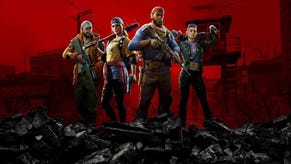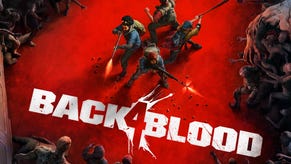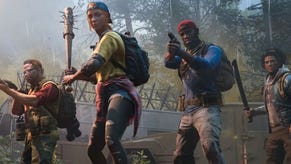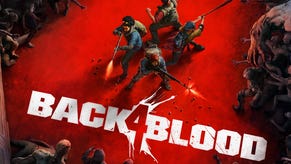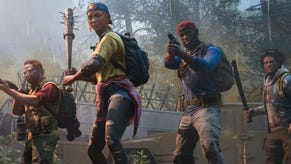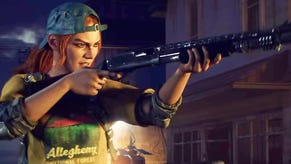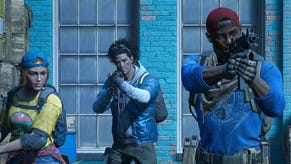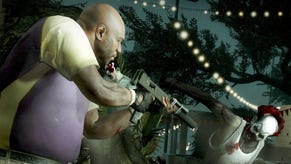The big Back 4 Blood interview: environmental storytelling, always online, and the new card system
It's no longer about surviving.
Perhaps one of the most anticipated games since its unveiling at The Game Awards last year, Back 4 Blood, developed by the makers of Left 4 Dead, marks a return to a lost era. Turtle Rock Studios has been explicit in saying that it has been disappointed by releases in the zombie shooter genre in the past decade, so it has come back to the genre do it itself. And while it has also been explicit about the fact that this is a new IP, the studio has not shied away from the game's familiarity with its spiritual predecessor and its formula.

The game was delayed in March, from 22nd June to 12th October, giving the team more time to finish it off. It was also revealed Back 4 Blood will be on Xbox Game Pass on day one and will be always online. An open beta is also set to be launched on 12th August, with early access available right now for those who pre-ordered.
I had the opportunity to try out the beta with Eurogamer's video team and have a chat with Chris Ashton, co-founder and design director at Turtle Rock Studios. I asked him about storytelling, Xbox Game Pass, the new card system, Left 4 Dead's legacy, and more.
Is Back 4 Blood just Left 4 Dead 3 in all but name?
Chris Ashton: You know, we did try to clean slate it. I think the foundation, some of the moment to moment feel, feels like a Turtle Rock game. We did have a lot of goals, a lot of things we wanted to bring to the genre in general, things we wanted to see in the game with the clean slate. So, for example, the eight playable characters was a big thing for us. And attaching some gameplay to those characters was important. Having a bigger story, this time, was important.
We've got a pretty big campaign with multiple acts. And there's a beginning and a middle and an end to the campaign. We have a variety of mission objectives and things you're doing out in the world, sort of activities. Our Cleaners are more soldier oriented, going out into the written world, voluntarily and destroying nests and stuff like that.
If anything, you have kind of a richer game, and you have access to more toys and stuff than you normally would. And so, having a co-op, or we call it a co-op oriented progression system, where whatever cards I played, also directly help you. That was a big thing for us. Even though you're still shooting zombies, small things, sprinting and ADS, and these more modern game mechanics coming into the game do change the formula a bit, and the pacing of the game and that sort of thing. We've got weapons with multiple attachments. They [the Cleaners] can have four different attachment types, that all change the way the weapons work. And we've got zombies with mutation points you can play, and you can change your species and stuff.
So it's just a tonne of stuff there. We didn't want to reinvent the wheel, but we did want to push it and try a bunch of new things, figure out what works, what really sort of amplifies or magnifies the feel of what's come before.
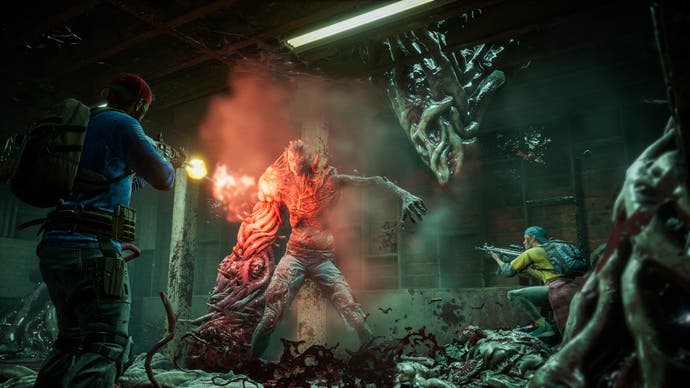
It's been almost 13 years since the first Left 4 Dead. Why did you feel like now is the best time for the studio to start working on a sort of revival of the genre, if you like?
Chris Ashton: Yeah, it's a big mix. You know, if you look at the history of Turtle Rock Studios, every single thing that we've ever done has been a new IP. And still, this is the first time that we've ever gotten to sort of go back to not necessarily the same IP but at least to a genre and subject matter we worked on before. But we've learned from each one of them. And as a team and as a studio, we've matured, and we've learned a lot of hard lessons. And there's a lot of us that just love that fantasy, the zombie killing fantasy. We're a studio that's always worked on team- based multiplayer games, and specifically asymmetrical multiplayer games as well. And so it's perfectly in our wheelhouse.
And then you've got stuff like Game Pass, right, which can bring this game to a much wider audience, and for them more affordably. So it's just, there's more people online than ever. Especially, considering, of course, when we started development, there wasn't the pandemic. But you consider how many people have machines at home and online connections.
So it's just sort of a combination of like, it's what we love, it's what we're good at. We wanted to be able to come back and revisit a subject matter and get a second chance at something. And I think, hopefully, the world is ready for it.

You mentioned Game Pass. There have been other games that launched on Game Pass on day one where servers became overloaded and players couldn't access the game. How can you ensure that fans won't have the same issues when the game is released in October?
Chris Ashton: It started with the alpha, where we got a limited number of people in online and playing. And of course, we're stress testing the servers and stuff. Then we've got the beta coming up here, which are going to be hopefully, you know, fingers crossed, get quite big numbers. Historically, Turtle Rock actually has a pretty decent record of the servers on launch day. So we've got a good team. And [we're] just doing our best to do all of our homework and cross all the T's and dot all the I's to make sure we're ready.
You also delayed the game by four months, just to put some extra polish into it. What has the delay afforded you to do that you were not able to do otherwise?
Chris Ashton: The big thing for us is we've probably had to cut less from this game than any other game that we've previously worked on. This game has significantly more content than any game we've ever worked on before.
When we set up, and we decided, okay, this is our story, and this is how many missions we have, how many sort of campaigns we play through and stuff, that's what we're shipping. And that's really, really cool for us too, it's the first time we've been able to do it. There's always challenges during development, and there's always goals that you set for yourself. And unfortunately, the realities of many things is that you don't get to see those things realised. But in this instance, man, I'm so proud of the team and the amount of stuff, the amount of content, that's coming with this game. So that was the big thing, that we didn't have to make any sort of painful cuts. This is what we wanted to build.
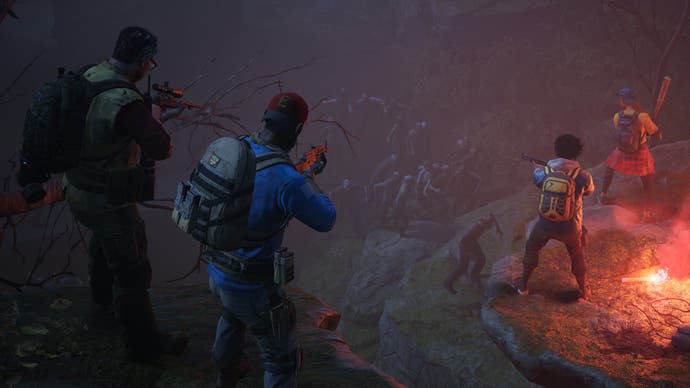
One of the biggest criticisms the game has received is the decision to make it always online, even during solo gameplay. The studio has said previously that there were plans in the future, possibly after launch, to have an offline only mode. Are there any updates on that? And also, what was the justification for making the game online only at launch?
Chris Ashton: Yeah, no, I don't have any updates. It was a talking point. I know they're working on it.
It is a challenge. In particular, because we have a progression system. You go in and you play the game; you earn supply points; you buy new cards; you build decks. That progression system is pretty important, and that's handled on the server side. So as soon as you want to play offline, like how do you handle that, right? Do you get to play with all the cards, do you get to play with none of the cards? Is there a crossover? So, just technically, it's a challenge. So we'll come up with a solution. I don't know what that's going to be yet or what it's gonna look like, but we'll figure it out.
So you have an annual pass. We already know there's going to be content drops with new characters, campaigns, etc. Will there also be updates to PvP?
Chris Ashton: I mean, absolutely. PvP is such an important part of the game. It's one of the things I think we as a studio do really well, and particularly the asymmetrical stuff, we've just got so much experience with it.
And we love being monsters. I love fighting against monsters, and I love being able to be on the other side and be a monster and being able to upgrade and change your monsters according to strategies.
So yeah, it's a big part of the game and for my personal preference, it just depends on my mood. If I'm in the mood to sit down with some friends, we're going to spend two, three hours chewing through the campaign that feels like a big adventure. So I'm going to play PvE but if I've got half an hour [or] an hour, and I just want to have raw fun, then I love to get in and play PvP. So you get the best of both worlds.

One of the things that fans really did like about the Left 4 Dead games was the environmental storytelling. How important was that for your team to keep that sort of environmental storytelling in this game?
Chris Ashton: Like I said, with this game, we wanted to have more story than we've ever had in any of our other games. And of course, it's always the story in a multiplayer game that is challenging, especially one that's not choreographed, so we don't know what's going to happen when. So you can't sort of cue conversation now, because you just got spit on by some Ridden. So yeah there's, there's a lot built into the environment. You know, it's a bigger campaign, so there's a lot more room and environment to tell stories.
But we've also got more characters, which means we've got different combinations of characters, right? So you might have played a mission 10 times, but now you're playing it for the 11th time, and it's a different combination of characters. Now a character can say something that you've never heard before. You're going to play through the whole campaign. And of course, there's the plot, and there's a beginning and a middle and an end. And so you're gonna see this story play out, you're gonna see those beats happen. But the background information, the background of the characters, the background of the world, and the environment and stuff, that's all gonna play out over many, many play sessions. It's something we're quite excited about. The team spends an insane amount of time researching and coming up with backstory.
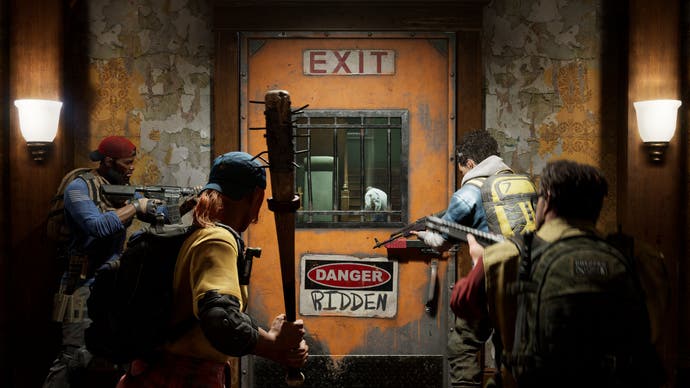
One of the bigger things is the card system. How did that come into conception? And how do you ensure that doesn't make the game too difficult? Or even too easy?
Chris Ashton: The card system was our solution for a progression system. You know we wanted to make sure if I have 1000 hours, that you have 10 hours, that when we get jumped in and play the game, that we shouldn't scale [the game]. I was pretty adamant that the damage an M16 does should be the damage that it does, regardless of how many hours I have into the game. And the zombies should have the same health that they have.
But then you try to figure out what you want that progression system to be. And that if I played 1000 hours, you play 10, we can jump into a game together, there's not really anything extra that you need to learn necessarily. My game should be really fun and your game should be really fun, right? It shouldn't be like, 'Oh, I'm, kind of slogging' or have a boring game because you're because you're a newbie, right? We want to make sure that wasn't the case.
So we wound up with this solution [that] the progression should be shared. So the original idea was like if I earn AK-47s, then I can spawn them in the world, and you can still pick them up and use them. And so that way, yes, I'm a higher level player, and I have progression, and I have access to things that you don't, except for when we're playing together. Now, suddenly, you do have access to all these things. So that was the foundation of the card system.
And we kept building on that until we realise the player has had a lot more control of the world, and the things around them. And the tools they have, you know, in checkpoints you can basically purchase weapons and gear, rather than just always having to scavenge it in the world. So you have a lot more control in the world. And that's part of the theme is the cleaners are, are not survivors, they're soldiers. You know, they're not just scraping by, they're choosing to go out into the world to do this.
So once we have that system, we realise we could use it for the Game Director. The Game Director could make the zombies move faster and it could make them have more health and it could make them hit harder, and it could make their heads explode. So it affects a lot of the game. Then we have to take a look at, okay, how do we deal with balance as you said, and we deal with that in a lot of different ways. If you play on the easier difficulties, then there's a lot less RNG. So, for example, a mission might always have fog. The director is always going to play the fog card on the mission. So, if you're playing on easy, you can strategise for it, and you can plan for it. So you can take certain cards to counter it.
But as you play in the harder difficulties, now the director gets to do that stuff on the fly. And so you don't know what's coming, you have to adapt, right? But you've got more cards, stronger cards, you've got more player skill and more experience, you're able to cope with that stuff a lot better.
We also designed into the system that if you fail, then you get stronger. You might have noticed that if you get wiped, and then go back to the checkpoint, that you still get to choose cards, any money that you picked up in the world, you get to spend on buying more equipment. So when I fail at first I'm like, 'Oh crap, we failed'. But then I get back to the checkpoint. I'm like, 'Oh, but I can buy two grenades instead of one this time'. And I've got this extra card that makes me have a combat knife for my melee, which kills zombies in one melee strike. And so now I'm kind of excited to go back in and I have reason to believe that we can do it, you know, I have hope. Which was kind of a big theme for the game, it shouldn't be the dour, sour, hopeless Apocalypse, you know, we should feel good about this. And we're going out there voluntarily. When it comes to balance, it's not just one thing. It's 100 things that go into it.



